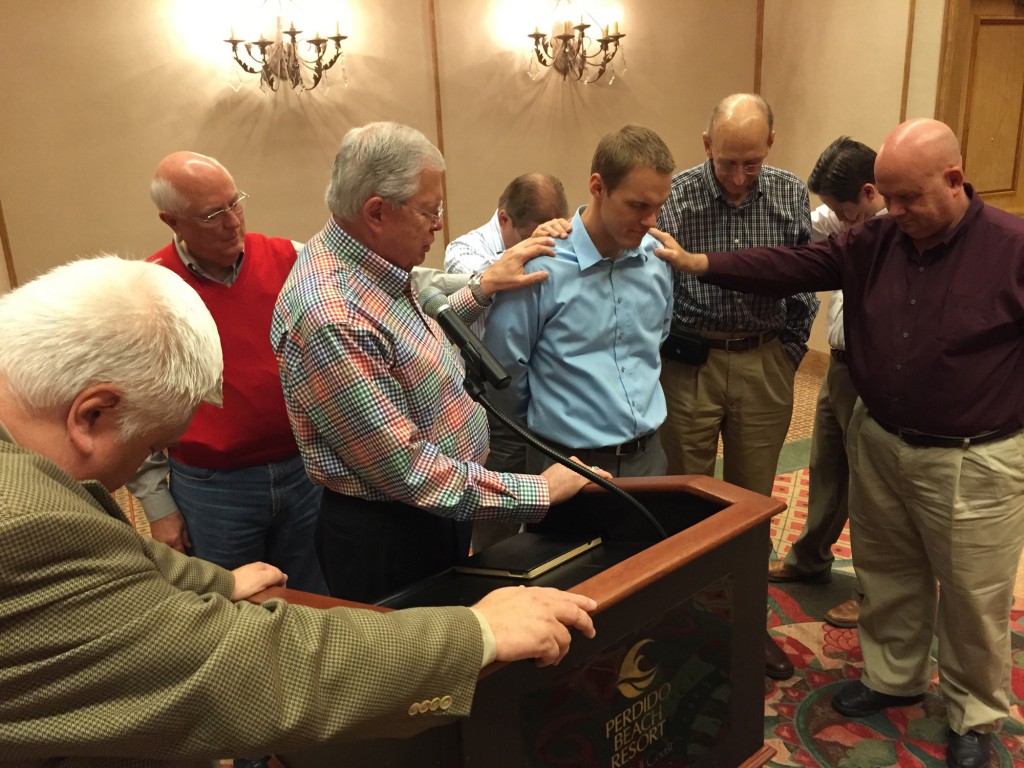by Art Toalston
ORANGE BEACH, Ala. (BP) — David Platt has “five desires that are driving me” as president of the International Mission Board.
Platt, speaking to editors of Baptist state papers Feb. 10, listed the desires that are key to him at the six-month point of his leadership of Southern Baptists’ overseas missions initiatives:
1. “to exalt Christ”
2. “to mobilize Christians”
3. “to equip the church”
4. “to facilitate church planting”
5. “to play our part in the accomplishment of the Great Commission”
“It’s not tolerable” that billions of people have never heard the name of Jesus, Platt said with resolve, or for children to be unreached by the Gospel while facing a life expectancy of less than eight years in parts of the world — or for 10-year-old children to face the horror of sex trafficking.

Baptist state executives and editors from around the country surround and pray for David Platt, newly elected president of the International Mission Board. Platt had shared with the group his five desires for the IMB during his time at the helm. Photo by Van Payne/IMB
While the International Mission Board supports 4,800 missionaries with a budget of nearly $300 million a year, Platt noted, “I’m convinced it’s a critical time for the SBC and IMB.”
The missionary force is down from a record 5,600 missionaries less than a decade ago, “and it’s dropping. We’re not able to support the missionary force we have now financially. That will drop soon to 4,200, likely, unless….”
Unless Southern Baptists make the sacrifices needed to rise to God’s call to reach the nations, to “think creatively” in their missions methods and to build on the blessings God has given the Southern Baptist Convention, Platt said.
Over the mission board’s history, 20,000 Southern Baptists have served as overseas missionaries, “which is an awesome number,” Platt said, “but the reality is we need 20,000 now.”
Platt spoke of his view of the Cooperative Program channel by which Southern Baptists support missions and ministries globally, nationally and in their states since he became IMB president after serving as pastor of The Church at Brook Hills in Birmingham, Ala.
“[In] the process of praying through accepting this role, and then certainly being in this role, I’ve been reminded in a fresh way, in a needed way, of the stewardship God has entrusted to the SBC and the value of the Cooperative Program,” Platt said.
To young pastors who might voice uncertainty about an “institutional” SBC compared to other missions networks, Platt reflected, “I say, I kind of understand that. I praise God for continuing to grow relational networks to get the Gospel to people who have never heard.
“And the same time, can you realize what God has given to the SBC?” he said, pointing to “conventions of churches, united together, with six strong seminaries who are raising up and training thousands of leaders every year [… and] the North American Mission Board and International Mission Board that are together spending half a billion dollars on the spread of the Gospel and the planting of the church in North America and the nations [… and the] ERLC” as an advocate for religious liberty.
“And the Cooperative Program,” Platt said, “[is] an engine that fuels all that. It would take 100 years to be able to get what we’ve got in the SBC, and once we did, we’d have a lot of the challenges that we have now. … [T]here’s so much value.
“I am in this role,” Platt said, “because I believe … in the unique stewardship that God has given to the SBC and the Cooperative Program.”
Platt set forth his key desires as IMB president in addressing the annual meeting of the Association of State Baptist Publications, Feb. 9-12 in Orange Beach, Ala.:
“to exalt Christ”
“We are tempted at every turn at church and in missions to do things in man-centered ways instead of Christ-guided ways … to develop our own plans and then go to God’s Word for permission to justify the plans we’ve come up with,” Platt said.
Rather, he said, “our responsibility is to go to the Word for direction. … We don’t exalt Christ by pragmatic methods that are just focused on what we think works [but on] what God has said in His Word that lasts throughout time.” Scripture, he said, must drive “the content of what we preach and the methods by which we spread [His] Word.”
People may try to think about how to make the Gospel “more palatable” to Muslims, Hindus, Buddhists, animists and others, Platt said, but “in the process we start to dilute the Gospel” and power of the cross to turn those who are lost to a saving faith in Christ.
God “has given us a clear plan for how the Gospel is to spread to the ends of the earth,” he said of making disciples and forming them into churches that are “reproducing by the power of the Holy Spirit.”
Platt added that Christ also is exalted by Christ-like missionaries.
“We are sending out brothers and sisters into some of the most difficult and dangerous … places and peoples in the world. We are going into areas where the adversary has had strongholds for generations, for centuries. …
“And so we must have personal holiness,” Platt said. A lost world needs “to see the character of Christ in us.”
“to mobilize Christians”
Platt said he prays for followers of Christ to increasingly realize “that global missions is not just a compartmentalized program of the church for a select few people. … It’s the very purpose for which we were created.”
God’s intention should stir people to consider: “How does that affect the way I pray? How does that affect the way I give? How does that affect opportunities I seek out to go and be a part of what God is doing around the world? And even if I don’t move somewhere else, how do I deliberately stay to spread the Gospel among the nations?”
Among history’s Moravians, Platt said, one of every 92 were crossing cultures to spread the Gospel with any vocational skills they had. If 10 million Southern Baptists had that mindset, there could be 100,000 Baptists doing the same today, he said.
“[T]his mission is too urgent not to think in those kinds of terms,” Platt said.
“There are ways that God in the global marketplace has sovereignly ordained for opportunities and avenues to be opened up,” he said. “I don’t want the IMB to be a funnel that … only a few people can squeeze through in order to get involved in God’s global plan. Avenues are wide open for people going and spreading the Gospel to people who have never heard it.”
“to equip the church”
“When you look at the New Testament, the local church is the agent that God has promised to bless for the accomplishment of the Great Commission. It’s the churches sending out missionaries,” Platt said.
“Mission boards have their place,” he said, “but it’s the role of every local church pastor to stand and proclaim God’s global glory in that local church.”
The IMB can help churches as they worship and pray “to send out people and to shepherd them as they go,” Platt said. “It makes all the difference in the world when those who go overseas are intimately connected with a local body of believers to pray for them, loving them and sending them.”
The IMB must not say to churches, “We can do this mission. If you’ll just send us missionaries and money, we’ll take care of it for you,” Platt said. “There’s a more biblical way. That’s to come alongside a local church and say, ‘Actually, you can do this. And here’s how we can help.'”
“to facilitate church planting”
The IMB can provide critical coordination for churches in sending missionaries, he said, citing two examples:
— matching missionaries from various churches — couples, retirees, singles — to where the need for the Gospel is greatest.
— helping churches with “how we most wisely get there” and “once we get there, how we best share the Gospel.”
“to play our part in the accomplishment of the Great Commission”
The Great Commission “can be accomplished and one day will be accomplished,” Platt said, citing the book of Revelation, chapters 5 and 7. “We know there is coming a day when every nation, tribe, tongue and people will gather around the throne of our King and sing His praise….
“As president of the IMB, I’m not living or leading for the perpetuation of this organization. I am living and leading for the day … when we’re not talking about unreached peoples anymore; instead, we’re talking about the return of the King.”
The Great Commission “does not rest on the shoulders of the Southern Baptist Convention. We’re a part of a global church family that God is orchestrating … for however we can best play our part.
“Don’t get me wrong, I believe He’s given us a significant part, and I look at the IMB as part of the broader picture of the SBC. … It’s really beyond words” — 40,000-plus churches “coalesced together for the spread of the Gospel in North America and the nations….
“Every single one of us has unique gifts, skills, opportunities” toward fulfilling the Great Commission, “every single member of our churches,” Platt said.
Art Toalston is editor of Baptist Press, the Southern Baptist Convention’s news service.
Reprinted from Baptist Press (www.baptistpress.com).
Baptist Press (BP) is the official news service of the Southern Baptist Convention and provides news to the 42 state Baptist papers. BP reports on missions, ministry and witness advanced through the Cooperative Program and on news related to Southern Baptists’ concerns nationally and globally.







